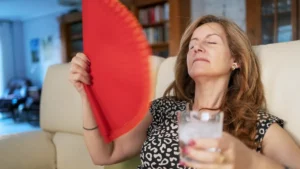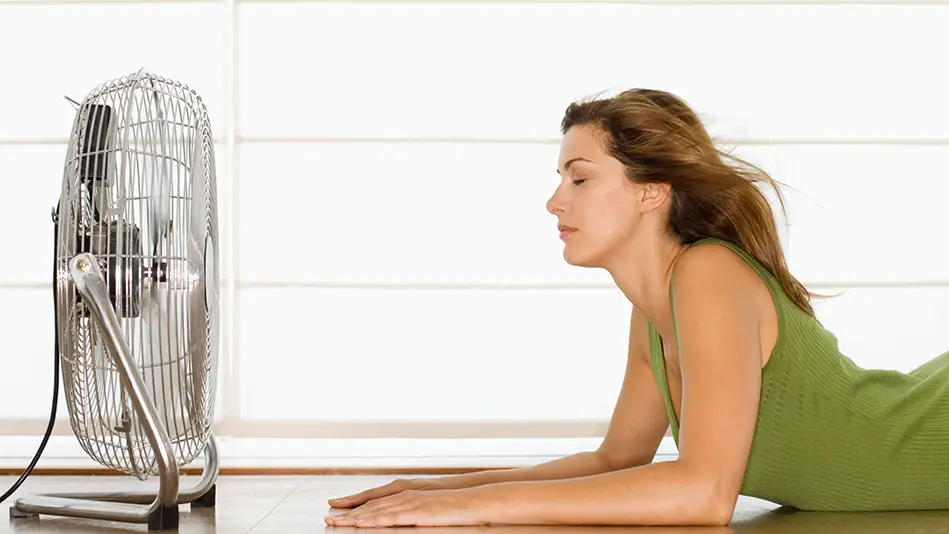Dealing with menopause challenges, especially hot flashes, can be tough. But don’t worry, we’ve got you covered with simple and effective relief strategies for hot flashes. Let’s bid farewell to the discomfort of hot flashes and explore easy solutions that really work.
Contents
Hot Flashes: What You Need to Know
Menopause brings about various changes in a woman’s body, and one of the most common and noticeable symptoms is the infamous hot flashes.
What Does a Hot Flash Feel Like?
A hot flash is a sudden, intense feeling of warmth that typically starts in the upper body and spreads to the face, neck, and sometimes the whole body. It can be accompanied by sweating, a rapid heartbeat, and a flushed or red appearance of the skin. For many women, this experience can be uncomfortable and disruptive, impacting daily activities.
What Can Trigger a Hot Flash?
 Hot flashes can be triggered by various factors, and knowing these triggers can help you better navigate and reduce their frequency. Here are common triggers presented in bullet points for easy understanding:
Hot flashes can be triggered by various factors, and knowing these triggers can help you better navigate and reduce their frequency. Here are common triggers presented in bullet points for easy understanding:
- Hormonal Changes: The primary cause of hot flashes during menopause is the hormonal shift, specifically a decrease in estrogen levels.
- Stress and Anxiety: Emotional stress and anxiety can act as catalysts for hot flashes, making relaxation techniques crucial for management.
- Spicy Foods: Certain foods, especially those high in spice, can trigger hot flashes in some individuals.
- Alcohol and Caffeine: Consumption of alcohol and caffeinated beverages may contribute to the onset of hot flashes for some women.
- Tight Clothing: Wearing tight clothing, especially in warm environments, can trap heat and induce hot flashes.
- Cigarette Smoking: Smoking has been linked to an increased frequency of hot flashes, making quitting or reducing smoking a potential strategy.
Understanding these triggers empowers women to proactively manage their hot flashes, making informed lifestyle choices to minimize discomfort during this phase of life.
Simple Ways to Manage and Find Relief From Hot Flashes

Hormone Replacement Therapy (HRT)
One effective way to manage hot flashes is through Hormone Replacement Therapy (HRT). This involves supplementing the body with hormones, typically estrogen and progesterone, to address the hormonal imbalances that contribute to hot flashes during menopause.
HRT helps by replenishing the declining levels of estrogen in the body, alleviating the symptoms associated with menopause, including hot flashes. It comes in various forms, such as pills, patches, creams, or gels. Women considering HRT should consult with their healthcare provider to determine the most suitable form and dosage.
Lifestyle Adjustments for Hot Flash Relief

Balanced Nutrition
Making simple changes in your diet can have a significant impact on managing hot flashes. Include foods rich in phytoestrogens, like soy products and flaxseeds. These compounds mimic estrogen and can help ease symptoms. Consider adopting a meal plan that incorporates these elements, as mentioned in the earlier section.
Stress Reduction Techniques
Reducing stress is another key strategy. Incorporate stress-relief techniques into your daily routine, such as meditation, yoga, or deep-breathing exercises. These practices not only contribute to hot flash relief but also enhance overall well-being.
Herbal Remedies for Hot Flash Relief
Black Cohosh
For a natural approach, consider incorporating Black Cohosh into your routine. This herb has estrogen-like effects, offering a non-pharmaceutical option for managing hot flashes.
Evening Primrose Oil
Rich in essential fatty acids, Evening Primrose Oil can help regulate hormonal imbalances, reducing the frequency and intensity of hot flashes.
Cooling Strategies for Immediate Relief

Cool Compress
When a hot flash strikes, applying a cool compress to the back of the neck or forehead can provide instant relief by lowering body temperature.
Dressing in Layers
Wearing lightweight, breathable layers allows you to easily adjust to temperature fluctuations, helping to minimize the impact of hot flashes.
Incorporating these simple yet effective strategies into your daily life can go a long way in managing and finding relief from hot flashes. Whether through lifestyle adjustments, herbal remedies, or hormone replacement therapy, there are various avenues to explore based on individual preferences and needs.
Foods That Bring Relief From Hot Flashes
 Managing hot flashes during menopause involves not just avoiding triggers but also incorporating foods that can provide relief. In this section, we explore a variety of delicious and nutritious options that can help you cool down and find comfort.
Managing hot flashes during menopause involves not just avoiding triggers but also incorporating foods that can provide relief. In this section, we explore a variety of delicious and nutritious options that can help you cool down and find comfort.
- Soy Products
Soy products are rich in compounds called phytoestrogens, which mimic the effects of estrogen in the body. Including soy-based foods like tofu, soy milk, and edamame in your diet may help balance hormone levels and reduce the frequency and intensity of hot flashes.
- Flaxseeds
Flaxseeds are a nutritional powerhouse, containing omega-3 fatty acids and lignans. These components have been linked to a reduction in hot flash symptoms. Consider adding ground flaxseeds to smoothies, yogurt, or cereals for a simple and tasty boost.
- Whole Grains
Whole grains, such as brown rice, quinoa, and oats, are not only heart-healthy but also contain complex carbohydrates that can help regulate blood sugar levels. Stable blood sugar levels contribute to a more balanced hormonal environment, potentially reducing hot flashes.
- Fruits and Vegetables
Colorful fruits and vegetables are packed with antioxidants and essential vitamins. These nutrients support overall health and may have a positive impact on hormonal balance. Aim for a diverse range of fruits and vegetables to maximize the nutritional benefits.
- Cold-Water Fish
Fish rich in omega-3 fatty acids, like salmon and mackerel, have anti-inflammatory properties. Including these in your diet can contribute to overall well-being and potentially alleviate hot flashes symptoms.
- Nuts and Seeds
Snacking on a variety of nuts and seeds, such as almonds, walnuts, and sunflower seeds, provides a healthy dose of essential fatty acids. These fats play a role in hormone production and may contribute to a reduction in hot flashes.
Incorporating these foods into your daily diet can be a flavorful and practical way to address hot flashes during menopause. While individual responses may vary, making wholesome and nutrient-rich choices can contribute to overall well-being and potentially provide relief from the discomfort associated with hot flashes.
Why Are Hot Flashes Worse at Night?
 Nighttime hot flashes, also known as night sweats, can be particularly bothersome during menopause. The hormonal changes that trigger hot flashes are not exclusive to daytime; they continue throughout the night. Additionally, the body’s natural circadian rhythm, which regulates temperature, can be disrupted during menopause, leading to more pronounced hot flashes at night.
Nighttime hot flashes, also known as night sweats, can be particularly bothersome during menopause. The hormonal changes that trigger hot flashes are not exclusive to daytime; they continue throughout the night. Additionally, the body’s natural circadian rhythm, which regulates temperature, can be disrupted during menopause, leading to more pronounced hot flashes at night.
Tips to Address and Prevent Nighttime Hot Flashes
- Optimal Sleep Environment: Keep your bedroom cool and use breathable bedding.
- Lightweight Sleepwear: Choose cotton or other breathable fabrics for comfortable sleep.
- Stay Hydrated: Sip water throughout the day but limit intake close to bedtime.
- Evening Cool Down: Take a cool shower or bath to lower your body temperature before sleep.
- Hormone Replacement Therapy (HRT): Discuss nighttime HRT options with your healthcare provider.
- Mindful Relaxation Techniques: Practice deep breathing, meditation, or guided imagery before bedtime.
- Evaluate Diet and Lifestyle: Limit spicy foods, caffeine, and alcohol in the evening.
- Consult a Healthcare Professional: Seek personalized advice for persistent bedtime hot flashes.
Conclusion
In conclusion, mastering menopause involves a multifaceted approach. By combining lifestyle adjustments, herbal remedies, and informed decisions about Hormone Replacement Therapy, you can effectively manage and reduce hot flashes. Take charge of your menopausal journey with these evidence-based strategies for lasting relief.
If you are facing menopause related issues, menopause treatment at HerMantra can help. Book your free trial online menopause treatment session now.


